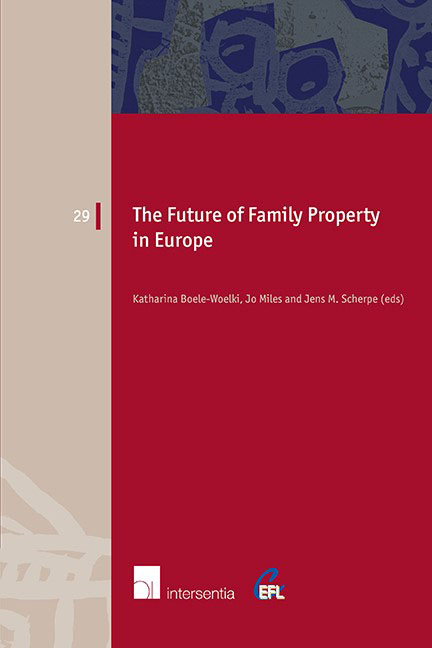Book contents
- Frontmatter
- Preface
- Contents
- List of authors
- PART ONE KEYNOTE LECTURE
- PART TWO MATRIMONIAL PROPERTY LAW IN EU ROPE
- PART THREE FAMILY CONTRACTS – ISSUES OF AUTONOMY
- PART FOUR PROTECTION OF OLDER PEOPLE IN LAW
- PART FIVE FREEDOM OF TESTATION AND PROTECTION OF FAMILY MEMBERS
- PART SIX CHILD MAINTENANCE
- PART SEVEN UNIFICATION OF PRIVATE INTERNATIONAL FAMILY LAW
- PART EIGHT CLOSING REMARKS
The Future of Family Property in Europe
Published online by Cambridge University Press: 08 May 2020
- Frontmatter
- Preface
- Contents
- List of authors
- PART ONE KEYNOTE LECTURE
- PART TWO MATRIMONIAL PROPERTY LAW IN EU ROPE
- PART THREE FAMILY CONTRACTS – ISSUES OF AUTONOMY
- PART FOUR PROTECTION OF OLDER PEOPLE IN LAW
- PART FIVE FREEDOM OF TESTATION AND PROTECTION OF FAMILY MEMBERS
- PART SIX CHILD MAINTENANCE
- PART SEVEN UNIFICATION OF PRIVATE INTERNATIONAL FAMILY LAW
- PART EIGHT CLOSING REMARKS
Summary
COMMON LAW MEETS CIVIL LAW …
Once upon a time, a German heiress met a French merchant banker in London. They decided to marry. But in order that she could be sure that he was marrying for love and prompted by her father, they concluded in Germany a pre-nuptial agreement the effect of which would be to preclude any provision for the husband in the event of their divorce. That agreement was concluded with the assistance of a notary in circumstances such that it would be binding as a matter of both French and German law. They married and set up home in England. When divorce sadly came some years and two children later, the proceedings were heard in London. This meant that English law would be applied, the English family courts invariably applying the lex fori to such matrimonial disputes. What standing would the prenuptial agreement have in these circumstances, given the substantial foreign aspects of the case? What relevance, if any, would be attached to the fact that the agreement would have been binding before a German or French court?
When we met in Cambridge in April 2010, the Supreme Court had just weeks before heard the appeal in the international pre-nuptial agreement case, Radmacher v Granatino. The Court's decision was handed down during the latter stages of the preparation of this volume in October 2010. Our conference proceedings and book editing could not have been framed by a more apt case: Radmacher v Granatino is a microcosm of so many of the debates pertinent to the future of family property law in Europe: about the jurisdiction in which matrimonial disputes and associated property and maintenance proceedings should be heard; about the law which should be applied by whichever court decides the case; about the force which parties’ own agreements – whether about the disposition of their property, or about choice of forum or law – should have; most basically, about how any domestic law ought to allocate property and award maintenance on divorce. And how apt too that the case should involve citizens of civil law jurisdictions being confronted by the rather different traditions of the common law world in which they had come to live, just as we at Cambridge were delighted to welcome so many of our civil law friends, and some common law cousins, to England for three days!
- Type
- Chapter
- Information
- The Future of Family Property in Europe , pp. 423 - 434Publisher: IntersentiaPrint publication year: 2011

